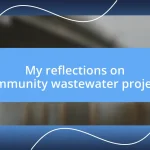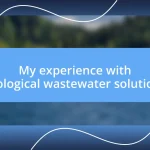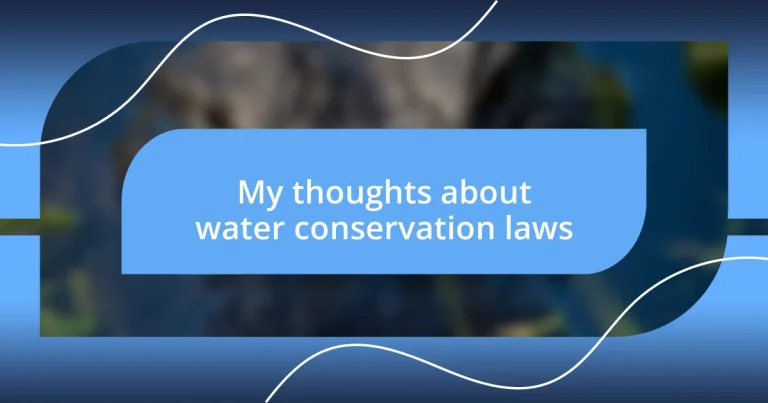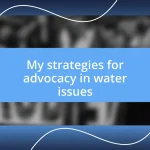Key takeaways:
- Water conservation laws encourage innovative practices and community engagement, making individuals more mindful of their water usage.
- Effective strategies like smart irrigation systems and water-efficient appliances significantly reduce water consumption while promoting sustainability.
- Community involvement in conservation efforts strengthens connections among residents, fostering a culture of sustainability and shared responsibility for water resources.
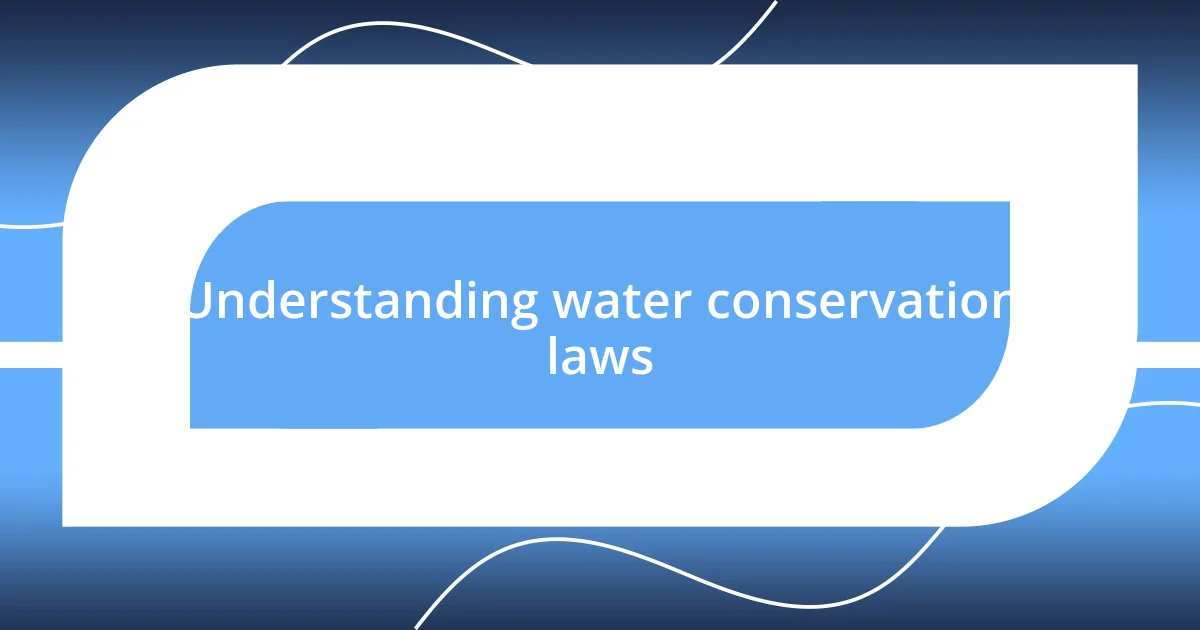
Understanding water conservation laws
Water conservation laws are designed to manage and protect our water resources, reflecting the urgent need to address water scarcity. I remember a time when my town faced severe droughts, and we had to adapt quickly to new regulations that limited outdoor watering. It was eye-opening to see how these laws encouraged my neighbors and me to rethink our water usage and find innovative solutions.
These laws often incorporate incentives for adopting water-saving technologies, which can be a game changer. When I installed a rain barrel at my home, I felt a sense of empowerment, knowing I was contributing positively to the environment. Have you ever considered how small changes can lead to significant impacts? It’s fascinating to think about how legislation can foster a collective commitment to sustainability in our communities.
Understanding the intricacies of these laws can feel overwhelming, but I’ve found that being knowledgeable empowers us. For example, knowing the specifics of penalties for excessive water use helped me better plan my garden irrigation. It’s all about creating a balance between enjoyment and responsibility, don’t you think? Ultimately, water conservation laws are more than rules; they’re a reminder of our role in preserving this precious resource for future generations.
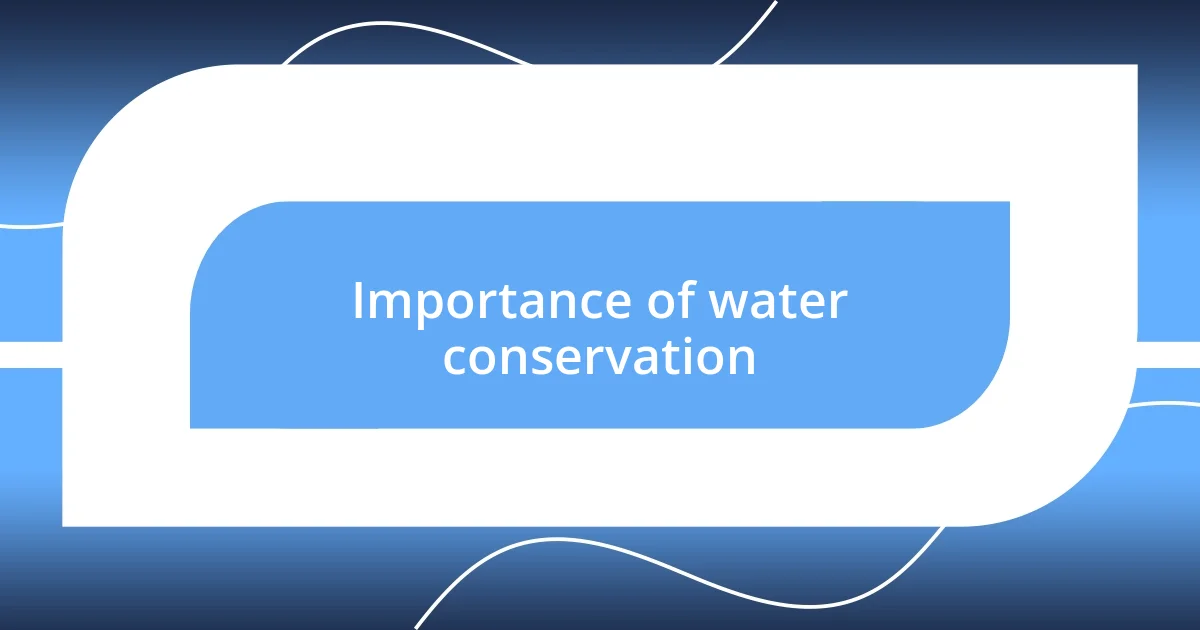
Importance of water conservation
Water conservation is essential for several reasons, and I’ve seen firsthand how improper water management can lead to dire consequences. In my hometown, during a particularly hot summer, we experienced a significant drop in our water supply. It was alarming to see our reservoirs getting lower with each passing week, making me realize just how crucial it is to use water wisely. Conservation isn’t just about saving water; it’s about preserving our way of life and ensuring that future generations have access to this vital resource.
Here’s a quick overview of the importance of water conservation:
- Sustaining Ecosystems: Our rivers, lakes, and wetlands rely on sufficient water levels. Reduced consumption helps maintain these habitats.
- Mitigating Drought: By conserving water, we can better prepare for dry spells and reduce the impact of drought on agriculture and drinking water supplies.
- Economic Benefits: Lower water usage can lead to reduced utility bills and cut costs related to water treatment and distribution.
- Community Awareness: When communities come together to conserve water, it fosters a culture of sustainability, encouraging everyone to take action for environmental health.
Reflecting on my experiences, I’ve come to appreciate that every drop truly counts. For instance, when I first started collecting greywater from my shower for my garden, I felt a sense of accomplishment. It wasn’t just about the money; it was about being part of something bigger, nurturing my little patch of earth while conserving precious water resources. It transformed my mindset about habits that, at first, seemed small and insignificant.
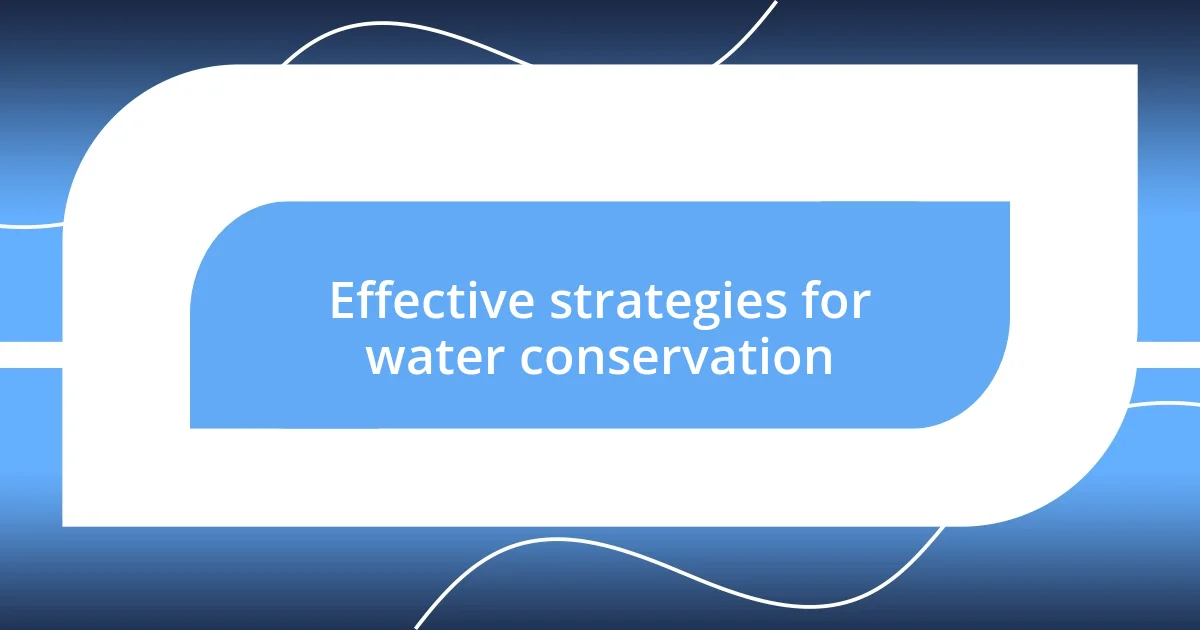
Effective strategies for water conservation
Effective strategies for water conservation are key to making a real difference in our communities. One approach that I found particularly effective is implementing smart irrigation systems. I remember the excitement when I set up a drip irrigation system in my backyard. It not only saved water but also targeted the plants’ roots directly, resulting in a healthier garden. Have you ever tried a method like that? It makes you feel more connected to nature and intentional in your water use.
Another strategy is promoting water-efficient appliances, like low-flow showerheads and washing machines. I recall the first time I replaced my old showerhead. The difference in water consumption was staggering, but I didn’t feel deprived at all! In fact, I found the experience refreshing and invigorating. Education around these technologies can empower people to make informed choices and take action that resonates with their values.
Furthermore, creating community rain gardens can be a fantastic initiative. These gardens capture rainwater and reduce runoff while adding beauty to public spaces. I vividly remember volunteering to establish one in my neighborhood; it fostered a sense of camaraderie among residents. It’s rewarding to see how collaborative efforts can lead to sustainability, showing us that conservation doesn’t just happen individually, but is amplified through our communities.
| Strategy | Description |
|---|---|
| Smart Irrigation Systems | Automated systems that conserve water by targeting plant roots, reducing overall usage. |
| Water-Efficient Appliances | Devices designed to use less water without sacrificing performance, promoting responsible consumption. |
| Community Rain Gardens | Collect rainwater, reduce runoff, and enhance local biodiversity while creating community involvement. |
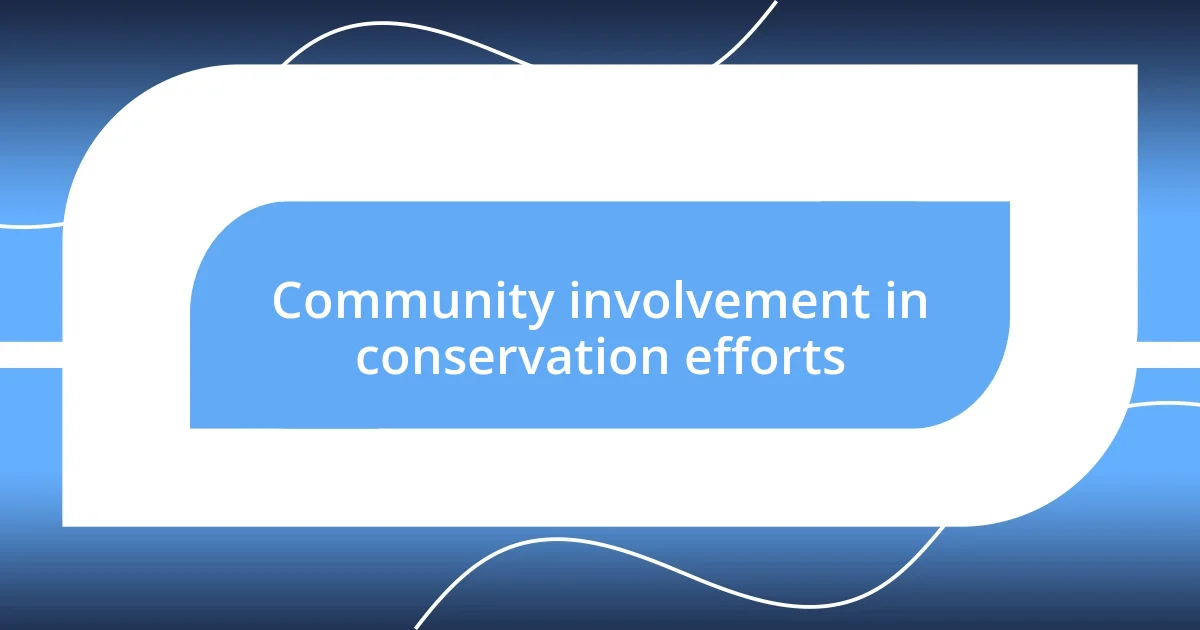
Community involvement in conservation efforts
When I think about community involvement in conservation, it reminds me of the time I joined a local neighborhood group focused on promoting water-saving practices. We organized workshops that educated residents on simple changes, like fixing leaky faucets and collecting rainwater. Seeing people get excited about these small, actionable steps was incredibly inspiring—it made conservation feel achievable rather than daunting.
Another experience that stands out happened during a community clean-up day at our local river. Not only did we pick up trash, but we also discussed how everyday choices, like using less water for gardening or reporting leaks, could positively impact our shared water sources. Engaging in conversations like that really deepened my appreciation for community spirit. Have you ever witnessed how collective effort can elevate a cause? It’s transformative!
I’ve also participated in a garden swap event where people traded their surplus veggies for tips on sustainable gardening. The sense of unity was palpable; everyone was eager to share knowledge and learn from one another. This exchange reinforced a crucial point: when communities rally around a common goal, like conserving water, they not only strengthen their bonds but also foster a culture of sustainability that extends beyond mere legislation. Wouldn’t it be wonderful to replicate that energy everywhere?


